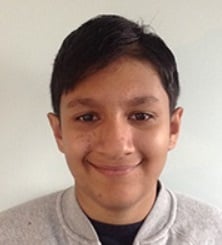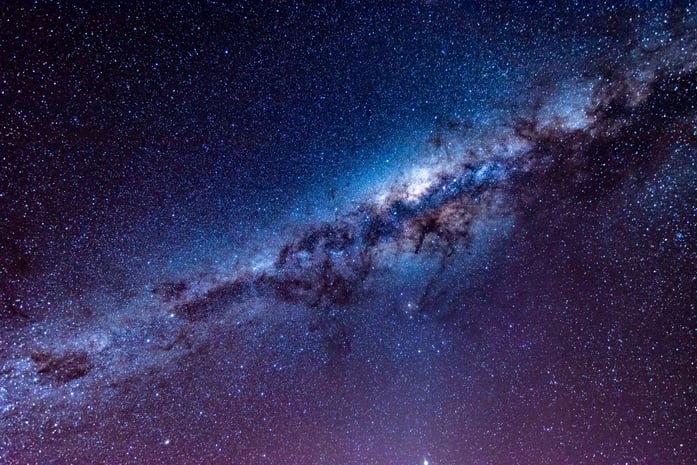He may only be 13, but Artash Nath has already been working at the interface of space, robotics and artificial intelligence for the last few years, presenting his projects at multiple international conferences. He is interested in deep space exploration and has been applying machine learning models to space challenges, including predicting risk index of an asteroid collision with Earth and detecting atmospheres of exoplanets using simulated data from space telescopes. His ongoing project is on creating curious and intelligent machines that learn by being placed in an immersive environment. They make efforts to understand cause and effect and are not hesitant to ask “why”.
Artash was the winner of NASA Space Apps Challenge Toronto 2018, 2017, 2014, and the 2017 Jesse Ketchum Award of the Royal Astronomical Society of Canada for his astronomical equipment related to Solar Eclipse.
In 2014, he co-founded his organization: HotPopRobot.com to bring space and astronomy education to the next generation.
At World Summit Americas, Artash will be presenting ‘Using Artificial Intelligence to predict Exoplanetary Atmospheres using data from Space Telescopes’
We caught up with Artash to find out more about his research, his take on the future of AI, and his advice to anyone wanting to get more involved in AI.

From your perspective what's the most exciting thing about the future of AI, and what do you think is the most misunderstood aspect of AI?
I am very excited about AI. What excites me most about the future of AI is the human brain-AI interface. We are seeing rapid advancements in understanding how human brain functions, how it learns new things, stores information, forms memories and can trigger attributes not yet seen in intelligent machines, namely emotions and curiosity.
Recreating the capabilities of brains, not just the biological deep neural networks but also transferring the “evolutionary head start” where human brains had 10 million years to acquire learnings from lived experiences of quadrillions of individuals, would be the next big thing. It would fundamentally change how we relate to AI, how we treat AI embedded systems and possibly the very definition of what it means to be human. Will systems that display emotions and curiosity be closer to humans or machines?
The most misunderstood aspect of AI is the fear of AI. A healthy fear of AI is essential so that we consciously apply AI for Good in building a just and progressive society. We have to create AI systems that are ethical, explainable, have respect for human rights, and are free of biases. However, we cannot let our fear of AI dictate the direction AI takes. Humanity has reached the stage where it has acquired mathematical, scientific and technologies capabilities to study effects at the quantum scale to the scale of the universe. We must use these capabilities to advance AI for inter-generational advantages.
Why is it important for you to be able to share your knowledge and meet other AI brains from across a multi-disciplinary audience like that at World Summit Americas?
Most of the challenges humanity is now facing are inter-generational, be it climate change, clean energy, antibiotic resistance or deep space exploration. To address them, we need to inspire everyone to think big and think beyond their disciplines. We must use all the intelligence, technologies, and computing power available to us to design a solution to these challenges.
As I am passionate about space exploration, planetary defense and robotics and am actively integrating AI with them, I am eager to share my work at the World Summit Americas. It will allow me to reach out to AI practitioners, policymakers and policy shapers in different sectors to generate newer ideas, collaborations and create global communities of practice around these areas.
What are you looking forward to most about World Summit Americas?
I am looking forward to igniting my mind by listening to leaders in AI coming from different disciplines and sectors: start-ups, governments, and the private sector. I am confident that being immersed in this high energy environment over two days would spark newer ideas, connections, and conversations. I am also looking forward to the panel discussion on scaling AI start-ups.
Can you share some detail of the presentation you are sharing on using AI to detect exoplanetary atmospheres - why it's important and why it couldn't have happened without AI?
Exoplanets are planets located outside our solar system. Over 4,000 exoplanets have been discovered so far, mostly by NASA's Kepler Space Telescope. New planets continue to be discovered by the Transiting Exoplanet Survey Satellite (TESS). These exoplanets come in range of mass, orbit, physical and chemical composition. Some are gigantic "hot" planets orbiting close to their parent stars; others are icy, rocky or ocean planets. Some of them even have their own moons. This brings us to one of the most fundamental questions humans have been asking every time they look up in the night sky: are we alone in the universe?

While we do not currently possess instruments to detect life on other planets, we are building ground and space-based telescopes that help us learn more about atmospheres of these exoplanets. By analyzing changes in light from the parent star when transited by an exoplanet we can predict chemical signatures in the exoplanetary atmospheres. This helps us learn more about elements and molecules present in exoplanetary atmospheres and come up with a "standard model" of how planets form and their atmospheric composition evolves over time.
While the data from ground and space-based telescopes are increasing exponentially, the astronomy community is not. AI comes to the rescue. AI can interpret big data sets, look for patterns in composite data sets comprising of images, time-series data, and spatial parameters. It can also flag when there is insufficient data to make predictions.
In my project, I had over 150,000 simulated observations of exoplanetary atmospheres provided by European Space Agency’s ARIEL Space Telescope alongside transit light curves in 55 different wavelengths and 300 time-step data points. In addition, 6 stellar parameters and planet-star radius ratios were available. I used AI to look for patterns in this multi-array dataset and to remove noise from exoplanet observations caused by starspots and by instrumentation.
I designed a hybrid machine learning model. The Model uses the Long Short-Term Memory (LSTM) Model, a form of Recurrent Neural Network (RNN) to handle the time series (or sequential) data such as transit light curves. It uses the Feed-Forward Neural Network to handle the numerical data such as mass, radius, temperatures, period, and the magnitude of stars generated by ARIEL. I then applied the Concatenate Layer to merge the two machine learning models before passing it through Dense Layers to get the output. This hybrid model provides a higher level of accuracy and outperforms LSTM only model.
This AI model is modular and can be modified to include data from other instruments and telescopes. The problem would have been difficult to solve without an AI algorithm.
Join Artash and more than 70 other incredible speakers at World Summit AI Americas, 25-26 March 2020. Book ticket now
WORLD SUMMIT AI AMERICAS
March 25-26th 2020
Palais des congrès de Montréal
Montreal, Canada
GLOBAL AI EVENTS CALENDAR
Here is your Global AI Events Calendar where you can meet the Inspired Minds community of business leaders, heads of government, policy makers, startups, investors, academics and media.
WORLD SUMMIT AI AMERICAS
March 25-26th 2020
Palais des congrès de Montréal
Montreal, Canada
INTELLIGENT HEALTH
09-10 September 2020
Basel, Switzerland
WORLD SUMMIT AI
07-08 October 2020
Amsterdam, The Netherlands
WORLD AI WEEK
05-09 October 2020
Amsterdam, The Netherlands
.png?width=259&name=WSAI%20Amsterdam%20Orange%20no%20dates%202000x300%20(1).png)
.png?width=263&name=IM_Mothership_assets_LOGO_MINT%20(2).png)

